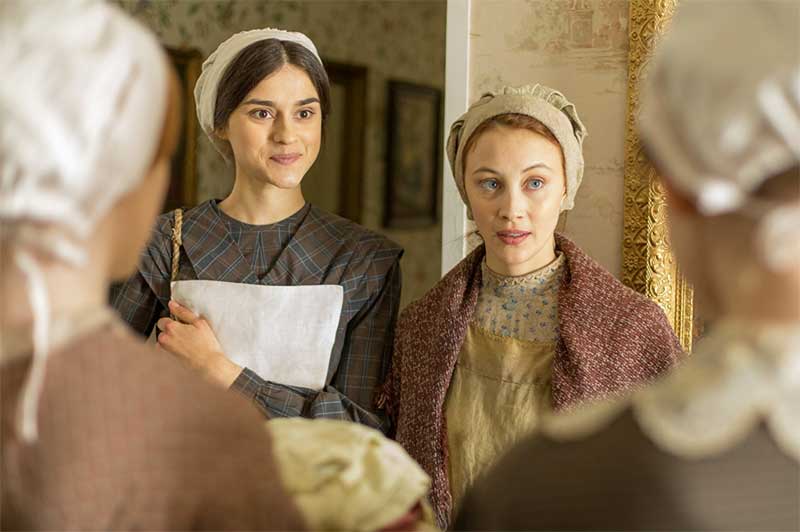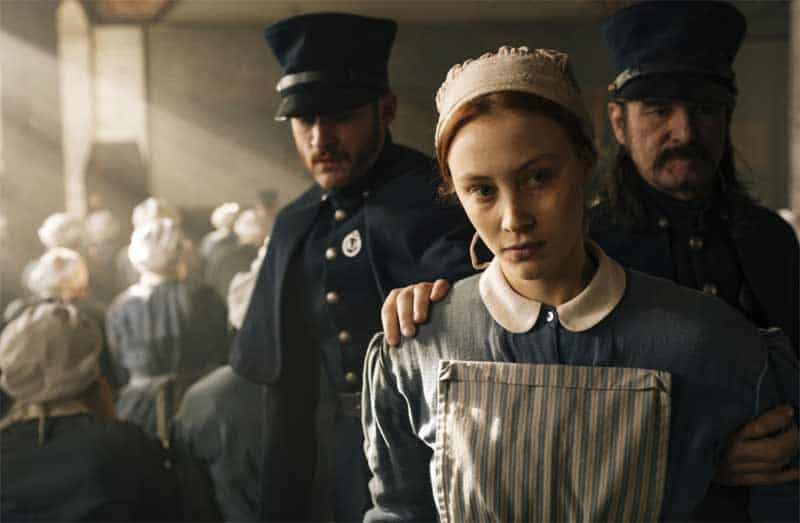Alias Grace arises from the brilliant collaborative team of Margaret Atwood who wrote the novel, Sarah Polley who wrote the adaptation for television, and Mary Harron who directed. Add Sarah Gadon who starred as Grace Marks and you have 4 powerhouse women working to bring Netflix viewers a moving 6 part series about a celebrated murderess.
There are spoilers ahead.
What I wanted more than anything as I watched Alias Grace was a way to use a yellow highlighter on all the great lines I wanted to savor again and again, the way I used to do with a book or do now with my Kindle. There were some thought provoking statements about the state of women, about politics, about immigrants, about class, about the behavior of men when they had money or power, and about women’s issues like abortion. Quotable to the max.
The story took place in the early 1800s, but the themes and issues are relevant as ever today. Things started slow, but by the 6th episode I was on the edge of my seat.
Grace Marks lived in a world where women were there to be used and abused. They were whores and sluts, not equals. No man felt responsible for any damage he did to a woman.

Grace worked as a house servant. She was an Irish immigrant in Canada. In her first job she met Mary Whitney (Rebecca Liddiard). She cherished that friendship all her life, even after Mary died from a botched abortion.
In Grace’s second job she worked for Thomas Kinnear (Paul Gross). In that house Grace was ordered about by the housekeeper Nancy Montgomery (Anna Paquin). It was the murder of Thomas Kinnear and Nancy Montgomery that landed her in prison.
At various times, Grace claimed to have no memory of the murders, or to blame stablehand James McDermott (Kerr Logan) for the murders. McDermott and another person who hung around the Kinnear farm Jamie (Stephen Joffe) both implicated Grace before a jury. Grace and McDermott were both convicted.

Where we enter the story, Grace had been in prison for about 15 years. A group of people believed Grace innocent and asked Dr. Simon Jordan (Edward Holcroft) to interview her and find proof of her innocence. Dr. Jordan and Grace talked for hours, days, weeks. It is through flashbacks during these conversations that we learn Grace’s history. Grace stitched a complicated quilt meant to enthrall Dr. Jordan. Were her stories true? True or not, he fell in love with her.
A peddler Grace had known and liked from years ago Jeremiah (Zachary Levi) appeared at the prison. He was now making a living as a hypnotist and no longer called himself Jeremiah. He convinced the committee and Dr. Jordan – the deciders of Grace’s fate – to let him hypnotize Grace to get the truth.
Jeremiah and Grace put on a magic act – or was it a real hypnotism? The results were so shocking Dr. Jordan couldn’t decide if Grace was insane or an amnesiac. A murderer or an innocent woman.
I don’t think the audience is meant to be able to decide what the truth about Grace is either. Was she who she said she was, or was she who her lawyer or her asylum doctor or the press said she was? Was she a reliable narrator of her own life story? Was she a Scheherazade, stitching away at an interesting story to make her situation more favorable for a longer time?

Women had no rights then. Prisoners sentenced to life even fewer. Was being a chameleon a brilliant survival tactic? Was captivating the mind of poor Dr. Jordan and driving him mad merely entertainment for Grace or was she honestly revealing her true story?
I won’t tell you how it ends, but it was a lovely irony and a brilliant twist in a twisty complicated story.
I recommend Alias Grace to everyone. I hope it won’t be pushed aside by men as a chick flick or a woman’s story. It’s a compelling, layered mystery that will entertain the imagination of men as well as women.
Sarah Gadon was extraordinary in this role. In milliseconds her entire demeanor could change. The look in her eyes went from one emotion to another at will. Her eyes, her intentions held me under her thrall. Just the first few moments of the first episode when Grace looks at herself in a mirror and debates about how to present herself next were award worthy. Powerful acting is subtle but effective in Sarah Gadon’s hands.
There is great depth and import in Alias Grace. Much of the credit goes to Margaret Atwood, who has a gift for telling feminist stories in unforgettable ways. Sarah Polley managed to hang on to the “Margaret Atwood-ness” of the story in the screen adaptation. I felt sure some of the lines – those lines I wanted to use a yellow highlighter on – were pure Atwood. What a comment on the times we live in that Atwood’s The Handmaid’s Tale and Alias Grace are so relevant to the current state of women’s rights.
Margaret Atwood appeared in one of the scenes. A lovely surprise.
The Netflix series is a Canadian production, filmed entirely in Canada. The history and locations are Canadian. Alias Grace talks quite a lot about the rebellion led by William Lyon Mackenzie in 1837. That rebellion captured the imagination of poor immigrants like Mary Whitney and Grace Marks, who longed for freedom and equality. Grace Marks is also a real figure in Canadian history.

Leave a Reply